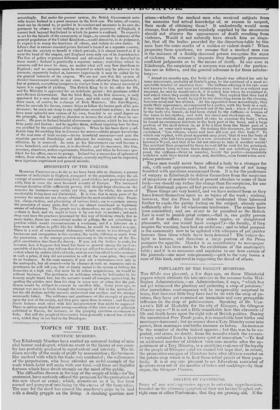DISHONESTY OF THE ENGLISH.
MORNING Cunt's tcLEŌĆöAs far as we have been able to discover, a greater number of individuals in England, compared to the population, enjoy the ad-
vantage of nutritive and stimulating food, good clothes, and protection against
cold, than in even the most favoured country of Europe. The increased average duration of life sufficiently proves, that though lame classesŌĆöas the weavers for instanceŌĆömay suffer, yet that, upon the wrade, the means of comfortable living have not diminished. It is true, that in many parts of the country the means are not always obtained in the most creditable way. Poach- ing, sheep-stealing, and plundering of various kinds, arc so common among the peasantry of many parts, that they are almost considered as legitimate means of subsistence. The people say to themselves, we are willing to work ŌĆöthere is food, and we ought to have it by one way or another ; and such deep root have the practices generated by this way of thinking struck, that in many trades, there are conventional modes of pillage, the not submitting to practise which would excommunicate a workman, and if a labourer on a farm were to refuse to pilfer like his fellows, he would be treated as a spy. There is a sort of conventional dishonesty which seems to run through all businesses and occupations in this country, the reality differing as much from the pretension, as the corrupt practice necessary to the working of the En- glish constitution does from the theory. If you ask the dealers in coals, for instance, how it happens that fraud has been so general among the most re- spectable of the body, they tell you that they are obliged to cheat in self-defence ŌĆöthat where by certain tricks of trade, certain men can afford to take contracts at such a price, if they did not contrive to sell at the same price, they could do no business. In the same manner, if you ask a tradesmanŌĆönot only in the metropolis, but all aroundŌĆöwhy he charges at such an enormous rate to gentlemen, he will tell you, that so firmly rooted is the system of bribing the domestics at a high rate, that were he to refuse acquiescence, he would be without business. The gentleman or nobleman whom he befriended bv his honesty might thank him, but the servants would all conspire against him, by spoiling the articles sent from his shop in some way or other, that the gen- tleman would be obliged to consent to sacrifice him. Sonic years ago, an attempt was made to Creak through the monopoly of fish in the metropolis ; but the old dealers and the servants understood one another, and the attempt necessarily failed. The noblemen and gentlemen set the example of preying upon the rest of the society, and they prey upon them in return ; and thus the frauds balance each other with less inconvenience than might be supposed. There is seldom much flagrant wrongŌĆönothing of the utter want of principle exhibited in Russia, for instance, or the grasping extortion so common in Italy. But still the people of this country have generally a moral law of their own, which they do not find in the Decalogue.





















 Previous page
Previous page